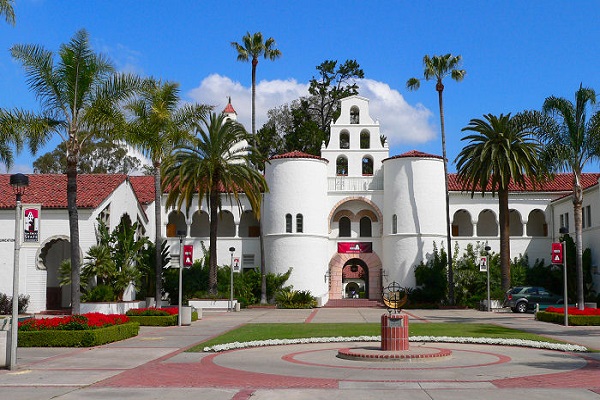San Diego State University: SDSU’s Paid Internship Initiative Aims to Close Opportunity Gap for Undergrads
Brandon Washiashi said phrases like “fiduciary management” and “financial consulting” were unfamiliar to him before this summer.
That was when the fourth-year international business major, with a minor in finance, landed a paid internship with Meketa Investment Group, which specializes in institutional investing.
Washiashi found the opportunity through a virtual Career Fair hosted by SDSU Career Services during the spring 2022 semester.
The internship, said the San Diego State University student, was such a positive experience that when the Carlsbad-based firm offered to extend his internship in August, he enthusiastically accepted.
“The opportunity allowed me to learn more about an industry I knew nothing about — but was interested in,” Washiashi said. “I saw how the company was run and learned practical knowledge relevant to the industry.”
It’s experiences like Washiashi’s that make internships a critical piece of the undergraduate experience, said officials in SDSU’s Division of Student Affairs and Campus Diversity.
The division recently launched an initiative with the goal of at least 75 percent of undergraduates participating in at least one paid internship by the start of the 2024-25 academic year.
Paid internships provide students with real-world experience, a leg up in the job market, and, in some cases, a pathway to a career, while getting compensated for their work.
“We don’t want students just to come to SDSU and we don’t want them just to graduate,” said J. Luke Wood, vice president of Student Affairs and Campus Diversity. “We want them to be able to go into careers that create a better life for themselves and for their families, and paid internships are a pathway to make sure we’re doing it.”
“We don’t want our students just to have jobs, we want them to have careers,” Wood added, “Careers where they can see career advancement and growth, and eventually are able to come back and participate in graduate programs here at SDSU to further their career mobility.”
Internships, highlighted in the university’s strategic plan, are considered one of several “high-impact” practices that studies have shown to foster higher levels of academic achievement and retention in school, as well as prepare students for a global workforce.
“It will help them better understand what they’re learning in the classroom but also apply it into the world of work,” said Danny Newell, the new executive director of SDSU Career Services.
The university has prioritized these high-impact practices with the student body, especially in the wake of the California State University Graduation Initiative 2025, which aims to improve graduation rates across the board, including for those from underserved communities and who have been historically underrepresented in higher education. It also seeks to eliminate achievement gaps for underrepresented students.
“SDSU has been working hard to create a seamless co-curricular experience for students, and while this has been a priority on campus for some time, it was elevated due to the system’s initiative,” Wood said.
“The fact we’ve been able to reduce equity gaps is directly related to our effectiveness in creating opportunities for students not only inside of the classroom but also outside the classroom and into their careers,” Wood said.
Newell said that paid internships set students up for long-term success. Career Services has been working to develop internship experiences that will allow all students to access the opportunities, including those who might not have the bandwidth to do a traditional internship.
“We’re looking at other experiential learning opportunities, like micro internships,” Newell said. “Does a student have the bandwidth to participate in, say, a 50-hour project over one semester? We’re looking at relationships on the academic side, maybe integrating internships or work activities into an internship course that is part of their academic experience.
“So we’re looking at a multifaceted approach to getting students into these work opportunities that will serve as a stepping stone into their long-term careers,” Newell said.
Newell said on-campus work experiences also have value.
“Employers don’t care if the experience is on or off campus, they are looking at three things when they are making a hiring decision. One is experience: Have you done any of this work before? Two is skillset: Have you the skills to do this job? And finally: subject matter expertise. As long as the on-campus jobs are providing that, they are extremely valuable to the student and the employer.”
For Washiashi, the experience he’s gained in his off-campus internship is something he’d enthusiastically recommend to his fellow students.
“I would recommend getting a paid internship for anyone, as you get to learn about an industry you may be interested in through hands-on experience,” Washiashi said. “It can connect you with the right people and set you up for success beyond college, and it can also allow you to discover if you really do like the industry you are interning in and if it is what you expected.
“If nothing else, you get to earn a paycheck while doing so,” Washiashi said.

